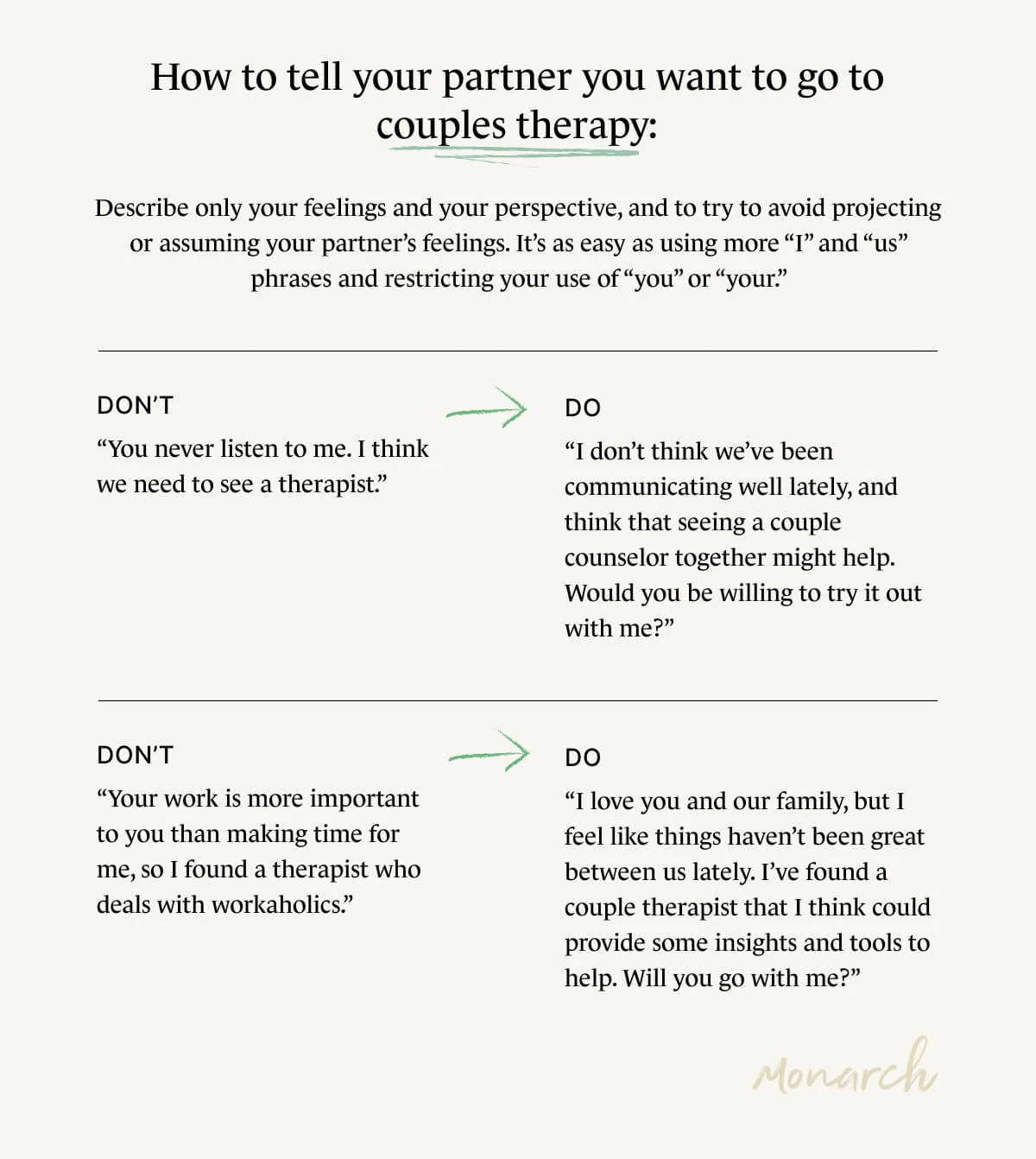The decision to go to couples counseling can be fraught.
For most of us, seeking therapy for ourselves is difficult enough.
It takes courage to ask for help and careful consideration to suggest another join you in getting marriage counseling.
Add in another person, especially someone we’re in a romantic partnership with, and it may make you too nervous to bring it up in a discussion.
It takes courage to ask for help and careful consideration to suggest another join you in getting marriage counseling.
For some couples, checking in with a therapist when things are going well—before embarking on a new milestone together such as marriage—can help align values, preferred communications styles, understand each other's relationship attachment style, and establish healthy boundaries and methods for dealing with conflict when it does arise.
For other couples, counseling is a “last resort,” a desperate attempt to triage a breakdown in their connection—and that’s okay, too.
Read on to find out:
How to find a couples therapist
How to tell your spouse you want to seek counseling together
What to do if your spouse doesn’t want to go to counseling

I think we should go to couples counseling—is that bad?
No, not at all.
It’s a good thing to be aware that something’s not right, and to be willing to enlist help to try to fix it.
Seeking couples therapy is hardly a sign that your relationship is over.
That said, marriage counseling is not a magic bullet.
Couples therapy is simply another strategy for building and maintaining the most fulfilling possible partnership.
The issue (or many issues) causing you concern will not be “solved” overnight.
Nor will counseling force you to stay with your partner—though it may help you see that you’re in a marriage that just doesn’t work for you or that you’re denying your own needs.
Couples therapy is simply another strategy for building and maintaining the most fulfilling possible partnership.
Try not to put a value judgment on it—counseling of any sort isn’t always going to be comfortable, but the goal is to get somewhere better, on your own as an individual, and as two individuals who make up a couple.
Do I find a counselor first? Or should I talk to my spouse first?
While there’s no “right” way to enter into therapy together, there are ways to make the process feel more equitable to all involved.
If you have concerns that your spouse may feel threatened by the suggestion of joint counseling, it may help to gently bring up the concept first, and then include them in the process of finding a counselor who meets both of your needs.
You can find a couples therapist who meets your criteria (and that of your spouse) in a few clicks online.
Depending on the unique personal history of you and your spouse, you may want to find a counselor who also has experience in specific areas, such as addiction or trauma.
You can find a couples therapist who meets your criteria (and that of your spouse) in a few clicks online.
The Monarch Directory by SimplePractice makes it easy to find a licensed couples counselor near you.
You can browse through therapists and marriage counselors who accept your insurance.
When you view an individual therapy provider’s page, in the section directly underneath their areas of specialty, you’ll see their fees per session and which insurance providers they accept.

Choose the right timing for the counseling conversation
Figure out a time when you’re both fed and well-rested and definitely not in the middle of a project.
For many couples, that might seem like an impossibility, especially when it comes to work, childcare or caring for other family members, and the nonstop onslaught of competing schedules that has become the norm of modern life.
Proposing counseling when your partner is exhausted, hungry, overwhelmed, or just trying to get the kids to bed, isn’t likely to be productive.
However, proposing counseling when your partner is exhausted, hungry, overwhelmed, or just trying to get the kids to bed, isn’t likely to be productive.
Find a quiet time—schedule it if you must—and take a moment to center your breath and your thoughts.
Okay, so what should I say to my partner?
Intention goes a long way in finding the right words to suggest relationship counseling.
Think about couching things in the terms of a loving partnership: this isn’t a punishment or indictment—it’s an act of your love for your family.
This isn’t a punishment or indictment—it’s an act of your love for your family.
A good thing to keep in mind is to describe only your feelings and your perspective, and to try to avoid projecting or assuming your partner’s feelings.
To do this, use more “I” and “us” phrases in your conversation, and restrict your use of “you” and “your.”
Instead of saying:
“You never listen to me. I think we need to see a therapist.”
Say to your partner:
“I don’t think we’ve been communicating well lately, and think that seeing a couple counselor together might help. Would you be willing to try it out with me?”
Instead of saying:
“Your work is more important to you than making time for me, so I found a therapist who deals with workaholics.”
Say your partner:
“I love you and our family, but I feel like things haven’t been great between us lately. I’ve found a couple therapist that I think could provide some insights and tools to help. Will you go with me?”

What if it's gone so far that we’re not able to talk civilly at all?
Number one, know that you’re not alone.
The fact that you’ve both decided to change things, and to find a way to talk to your spouse in a calm setting—even a virtual one, if you’re opting for a telehealth session—is progress.
Try to describe only your feelings and your perspective, and to try to avoid projecting or assuming your partner’s feelings. To do this, use more “I” and “us” phrases in your conversation, and restrict your use of “you” and “your.”
In this situation, it may help to find your own counselor first, and to work with them on the language and approach to engage your partner in an honest and heartfelt way.
It’s great if your counselor also specializes in marriage/relationship counseling, but even if they don’t, they can help you find a solution that aligns with your values and needs, while still taking into consideration those of your partner.
My spouse doesn't want to go to counseling. Now what?
It’s not uncommon for one partner to be resistant, or even completely unwilling, to getting couples counseling.
There are a lot of reasons why this might be the case: fear of vulnerability, fear that the truth will hurt you in some way, or simple denial that things need to change—or that change is possible.
Some spouses worry that the therapist will “choose” their partner’s “side” over theirs.
This can be especially true when that partner has a preexisting relationship with the therapist who will be leading the joint sessions.
In this case, you’d want to assure your spouse that defusing “favoritism” would be a priority from the start.
Still, there just may be no convincing your spouse to join you in therapy. And that’s okay.
The best advice here is definitely to find your own therapist as soon as possible. You can work your counselor to discuss the issues of the relationship and your part in them. You can also practice communication skills that can help improve everything from the tone to the substance of interactions with your spouse.
Remember that good communication is also about listening, and your own therapist can work with you to find ways to improve your own listening skills in your relationship.
Will marriage counseling save my marriage?
No. Marriage and relationship counselors work together with their clients (you and your spouse) to find a path forward that works for both of you.
Many couples enter counseling wanting to align their feelings and needs, but that’s not always possible—and sometimes it’s not even the healthiest option.
Likewise, many people enter relationship counseling with the purpose of navigating an amicable separation.
However, after meeting with a licensed counselor, they may be better able to communicate and wind up wanting to stay in that committed relationship with their partner.
Every person, and every relationship, is unique.
A good therapist recognizes that and works to remove any agenda from group therapy sessions except for that set by the patients themselves.

We've gone to a few sessions, and things aren’t getting any better. Should we stop? Change therapists?
Maybe. But know that counseling is bound to get uncomfortable at some point, but that’s often a sign that you’re digging into important stuff.
And again, couples therapy is no magic bullet.
You and your partner are complicated, multifaceted people, and you each have a lot to unpack individually when you first sit down with a couples counselor.
You may find some things improve, and then other issues are given room to rise to the surface.
This is called “doing the work.” It’s a process. Give it time.
You may find some things improve, and then other issues are given room to rise to the surface.
Of course, if you’re feeling at any point that the counselor you’ve both chosen to work with doesn’t respect your needs or simply isn’t present for each session, then you may want to try sitting down with someone else—it’s always okay to get a second opinion.
But, if you find yourself seeking fourth and fifth opinions, the issue may be with your own concept of therapy.
After a few sessions, you should at least feel like you have a few tools to communicate better with your spouse outside of the counseling room, and that you’ve been able to express some of concerns in a safe space.
It will get better—it may not be the result you had planned or imagined, but there’s a very good chance that you didn’t expect or plan to be in couple counseling.
Go easy on yourself and take heart in knowing that you are taking steps towards a happier, healthier life on your own terms in the long run.
How to find couples counseling near you
With a network of over 120,000 counselors, the Monarch Directory by SimplePractice makes it easy to find a licensed couples counselor near you.

Also, choose to browse through therapists and marriage counselors who accept your insurance.
Searching for a great therapist near you? Check out the Monarch Directory by SimplePractice to find a licensed therapist with availability and online booking.









